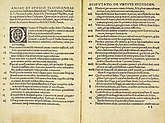
Posted on 10/31/2012 2:40:55 PM PDT by Alex Murphy

The 95 Theses
On this day in 1517 a relatively unknown German monk pounded a proclamation of sorts onto a church door in Wittenburg, Germany. In the empty spiritual bucket created by a corrupt Catholic Church hierarchy and alongside a godless Renaissance, Luther’s 95 Theses represented renewal. They were a call back to personal and corporate holiness that resounded well past the door frames of the church.
There are six attributes common to all movements and we can easily see them in Luther’s Reformation. For those of us bent on seeing movements of transformation the lessons are worth reviewing.
Affinity group recruitment: Luther’s translation of the Bible into the vernacular language of the common man made it possible for the message to be passed from person to person. The printing press fueled the writings of Luther and the message quickly spread from town to village to city. Originally, Luther has posted his 95 Theses in Latin. Others translated and printed them into pamphlets and they were passed hand to hand across the European continent.
Common acts of commitment: The Catholic Church, in the early 1550s, demanded not only spiritual obedience but was a mark of citizenship. The act of separating oneself from the Church was an act of disloyalty to the European order. It was a radical act but one that cemented the newly forming “Protesting Church” into what sociologist call a “densely packed social network.” Benjamin Franklin captured what these types of “no return” acts do for a movement at the signing of the American Declaration of Independence: “We must all hang together, or assuredly we shall all hang separately.”
Opposition (real or perceived): Luther did not intend to abolish the Catholic Church but to reform it. his wine, however, was too new for the old wineskins and the Church turned on its monk, seeking to imprison him and stop his criticisms. This gave way to the sort of persecution that feeds the flames of rapidly growing movements.
Retro-revolutionary ideology: Luther’s message was a reformer’s message. Rarely do movements take hold and flourish when their ideology completely replaces a group’s foundational understandings. Jesus was thoroughly Jewish (retro) yet his message demolished the status quo (revolutionary). Luther similarly embraced the truths of the Bible while challenging the Church’s grip on power.
Network structures: The Reformation would eventually coalesce into a number of strategic and important “centers” of activity. Calvin’s Zurich is perhaps the most important one. However, the message of opposition to the centralized Catholic Church produced a host of leaders who each battled for their perspective of the church. This inevitably gave way to a healthy fragmentation and the sharing of leadership among a wide array of movement leaders.
Set of favorable circumstances: There are few eras that have been as ripe for change as the 1500s. Luther walked into a century that would give us Da Vinci, Galileo, the first globe, incredible intercontinental adventures, flush toilets, and bottled beer. The list goes on and on! The religious culture of Western Europe had become a fusion of folk mysticism blended with Catholicism. People were searching for more substantial answers to the problems of life and Luther’s Bible translation was ready to fill that void.
One could argue that the Reformation has affected global Christianity more than any other historical event since the New Testament era. I find it telling that today we celebrate Halloween, a part of that mystical folk religion of Europe, on this day rather than Luther’s unknowing act of bravery. Instead of teaching our children to say “trick or treat” perhaps they should learn to say, “Happy Reformation Day.”
Perhaps the time is ripe for a new movement.
....There are few eras that have been as ripe for change as the 1500s. Luther walked into a century that would give us Da Vinci, Galileo, the first globe, incredible intercontinental adventures, flush toilets, and bottled beer. The list goes on and on! The religious culture of Western Europe had become a fusion of folk mysticism blended with Catholicism. People were searching for more substantial answers to the problems of life and Luther’s Bible translation was ready to fill that void.
One could argue that the Reformation has affected global Christianity more than any other historical event since the New Testament era. I find it telling that today we celebrate Halloween, a part of that mystical folk religion of Europe, on this day rather than Luther’s unknowing act of bravery. Instead of teaching our children to say “trick or treat” perhaps they should learn to say, “Happy Reformation Day.”
“Reformation Day” is not in my Bible.
“...a relatively unknown German monk pounded a proclamation of sorts onto a church door in Wittenburg, Germany.”
I never heard of Reformation Day before you started posting, but now that you remind me, you Lutherans owe us Catholics for a new church door.
Neither is “Christmas” or “Easter.”
There have been many Islamic Martin Luthers

Too bad he didn’t look to the East. Many of his complaints would have been answered by Orthodoxy. However, transubstantiation would have been one sticky wicket.
Nor is pope. The word reverend is mentioned once but only in reference to God.
Eventually, he would come to fame as part of a Paul McCartney song (along with Bill and Dawn/Don).
Luther, at least to my knowledge, never killed anybody.
Did he at least sell indulgences to finance his ministry?
***you Lutherans owe us Catholics for a new church door.***
And you will have it for sale on E-Bay before the new door has it’s hinge pins driven in! ;-D
***Too bad he didn’t look to the East. Many of his complaints would have been answered by Orthodoxy.***
I remember reading here on FR many years ago that Luther DID try to contact the Patriarch of Constantinople several times.
As for transubstantiation, I believe Lutherans do believe in it.
Luther, at least to my knowledge, never killed anybody.
I was referring tot he poor guy who was missing his body...
Lot of Islamic Luthers have been missing wither their heads or their bodies....
The Lutheran view of communion is consubstantiation.
http://www.gotquestions.org/consubstantiation.html
I don’t understand the significance of the artwork - sword slicing off head.
I don’t understand the significance of the artwork - sword slicing off head.
Yup -- the problem is the motto "semper reformanda" -- always reforming. There are new directions being found, new interpretations everyday.
Each new bunch of Reformatters reformats the old.
Disclaimer: Opinions posted on Free Republic are those of the individual posters and do not necessarily represent the opinion of Free Republic or its management. All materials posted herein are protected by copyright law and the exemption for fair use of copyrighted works.